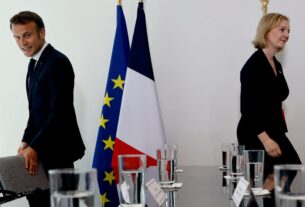It was all smiles as EU Values Commissioner Věra Jourová received a gift of Krówki, a special kind of Polish cream fudge, from Poland’s new European Affairs Minister Sekretarz Stanu at their first meeting in Luxembourg earlier this week.
But it’s going to take more than a box of fudge to rebuild the increasingly acrimonious relationship between Warsaw and Brussels over Poland’s adherence to European democratic and rule-of-law standards.
A potential new front in the years-long battle between the Law and Justice-led government and the European Commission has just opened up.
The reason? Poland — by its own admission, according to the Commission — is not complying with the EU’s Charter of Fundamental Rights.
The outcome? The Commission has suggested it can’t yet hand over money Poland is owed from the EU’s so-called “cohesion” funds, meant to offset economic imbalances across the Continent.
Officials have stressed that no decision is imminent. Reimbursement for the spent cohesion funds could be at least a year away, and Poland has not yet requested its refunds. But the prospect of the Commission withholding portions of Poland’s enormous €75 billion slice of the EU’s budget pie has sparked uproar in Warsaw.
The clash may come to a head this week when Polish Prime Minister Mateusz Morawiecki arrives in Brussels for an EU leaders’ summit, with officials not ruling out bilateral meetings with Poland on the matter.
More broadly, the row is also striking at the heart of what EU membership means. While many, mostly Western, EU members are calling for the Commission to get even tougher on Poland, others, including Hungary and newer members in Central and Eastern Europe, are wary of EU over-reach and the Commission meddling in domestic affairs.
The feud unfolds
As with many countries that joined the European Union as part of the wave of new members in 2004, Poland has greatly benefited from cohesion funding. Often used to build schools, hospitals and other development projects, the money is one of the most tangible benefits of EU membership.
Initially, Warsaw tried to downplay the threat to its cohesion cash. But soon, it quickly pivoted to a familiar stance — the blame game. In its crosshairs: Commission President Ursula von der Leyen and Donald Tusk, a former Polish prime minister and European Council president who is considered one of the Law and Justice party’s biggest political threats.
“The [opposition] Civic Platform and Donald Tusk, along with German politicians who give them great support in this, led by the German head of the EC Ursula von der Leyen, are responsible for blocking European funds due to Poland,” Justice Minister Zbigniew Ziobro said at a news conference on Monday.
Poland is already embroiled in a heated row with the Commission about access to the EU’s pandemic recovery funds, a separate tranche of EU funding.
Receiving those funds depends on meeting a list of EU-prescribed conditions — and so far Poland has not fulfilled the bloc’s criteria on the rule of law, judicial independence and democratic norms.
In a potential breakthrough, the European Commission in June endorsed a plan allowing Poland to unlock roughly €36 billion in grants and loans from the EU’s recovery fund — but only if it met certain milestones.
Yet since then, no money has actually gone to Warsaw because it has not hit the EU’s targets.
Still, von der Leyen’s decision to green-light the funds — even if just in principle — sparked significant opposition from at least five commissioners who argued the Commission chief was being too soft on Warsaw.
However, EU member states later signed off on von der Leyen’s approach at a July meeting of finance ministers, reflecting goodwill towards Poland as a leader in both arms donations to Ukraine and refugee intake from the war. The Netherlands was the only country to abstain.
“Ultimately, there was a sense that no one really wanted to confront Poland given their stance on the Ukraine war,” said one EU diplomat from a country that has traditionally been concerned about Poland’s breaches of EU values and norms.
But there is a very different view within the European Parliament, which has been leading the way in urging the Commission to take a tougher line on Warsaw.
Juan Fernando López Aguilar, the Spanish Parliament member who chairs the committee overseeing civil liberties and justice, told POLITICO that while he commends Poland’s stance towards Ukrainian refugees, it is a separate issue from the rule of law.
“We continue to have serious concerns about the situation in Poland, including the dismantling of the disciplinary chamber and the need to implement the rulings of the Court of Justice,” he said, referencing Warsaw’s failure to adopt rulings from the EU’s top court.
“We do not go along with the Commission’s decision this summer, and urge them to strongly monitor the fulfillment of the requirements,” he added.
Unintended consequences?
Whatever the moral underpinnings of the EU’s decision to withhold funds from Poland — whether through the pandemic funds or cohesion payments — the idea of the EU blocking money to an errant member state may help fan the flame of populism in Europe’s fifth most populous country, as the Law and Justice party uses the standoff with the Commission to demonize Brussels.
Already, Hungary’s Viktor Orbán has seized on the threat to Poland’s cohesion funds, accusing Brussels of “blackmailing” a member state.
“While the European economy is on the brink of #recession, the @EU_Commission is busy blackmailing a member state. Such a shame. Go, Poland! Go, @MorawieckiM!,” he said on Twitter, tagging the Polish prime minister.
With Poland gearing up for elections next year — and rumors abounding of Tusk’s possible political comeback — Poland’s increasingly fractious relationship with Brussels is likely to become one of the dominant themes across the country.




